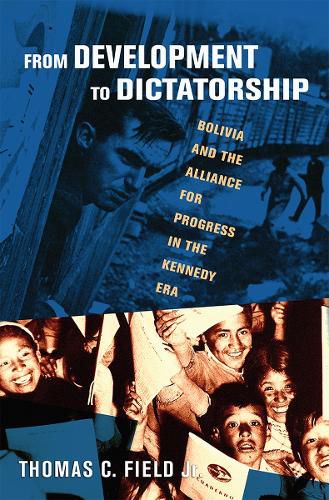Readings Newsletter
Become a Readings Member to make your shopping experience even easier.
Sign in or sign up for free!
You’re not far away from qualifying for FREE standard shipping within Australia
You’ve qualified for FREE standard shipping within Australia
The cart is loading…






During the most idealistic years of John F. Kennedy’s Alliance for Progress development program, Bolivia was the highest per capita recipient of U.S. foreign aid in Latin America. Nonetheless, Washington’s modernization programs in early 1960s’ Bolivia ended up on a collision course with important sectors of the country’s civil society, including radical workers, rebellious students, and a plethora of rightwing and leftwing political parties. In From Development to Dictatorship, Thomas C. Field Jr. reconstructs the untold story of USAID’s first years in Bolivia, including the country’s 1964 military coup d'etat. Field draws heavily on local sources to demonstrate that Bolivia’s turn toward anticommunist, development-oriented dictatorship was the logical and practical culmination of the military-led modernization paradigm that provided the liberal underpinnings of Kennedy’s Alliance for Progress. In the process, he explores several underappreciated aspects of Cold War liberal internationalism: the tendency of development to encourage authoritarian solutions to political unrest, the connection between modernization theories and the rise of Third World armed forces, and the intimacy between USAID and CIA covert operations. Challenging the conventional dichotomy between ideology and strategy in international politics, From Development to Dictatorship engages with a growing literature on development as a key rubric for understanding the interconnected processes of decolonization and the Cold War.
$9.00 standard shipping within Australia
FREE standard shipping within Australia for orders over $100.00
Express & International shipping calculated at checkout
During the most idealistic years of John F. Kennedy’s Alliance for Progress development program, Bolivia was the highest per capita recipient of U.S. foreign aid in Latin America. Nonetheless, Washington’s modernization programs in early 1960s’ Bolivia ended up on a collision course with important sectors of the country’s civil society, including radical workers, rebellious students, and a plethora of rightwing and leftwing political parties. In From Development to Dictatorship, Thomas C. Field Jr. reconstructs the untold story of USAID’s first years in Bolivia, including the country’s 1964 military coup d'etat. Field draws heavily on local sources to demonstrate that Bolivia’s turn toward anticommunist, development-oriented dictatorship was the logical and practical culmination of the military-led modernization paradigm that provided the liberal underpinnings of Kennedy’s Alliance for Progress. In the process, he explores several underappreciated aspects of Cold War liberal internationalism: the tendency of development to encourage authoritarian solutions to political unrest, the connection between modernization theories and the rise of Third World armed forces, and the intimacy between USAID and CIA covert operations. Challenging the conventional dichotomy between ideology and strategy in international politics, From Development to Dictatorship engages with a growing literature on development as a key rubric for understanding the interconnected processes of decolonization and the Cold War.